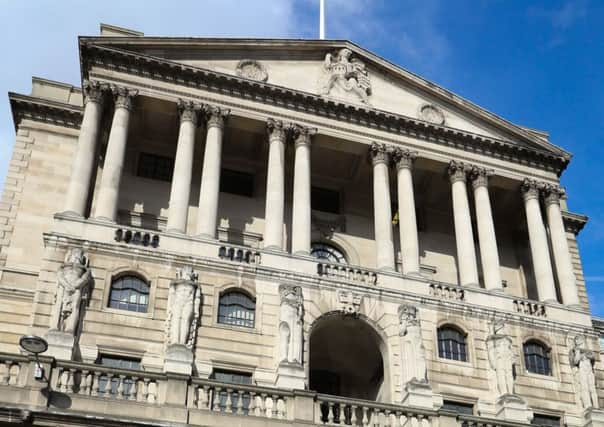CEBR: Interest rates on freeze until mid-2016


Publishing its latest forecasts, the Centre for Economics and Business Research (CEBR) said it expects the bank base rate to remain at its historic 0.5 per cent low until next summer before a hike by the central bank’s monetary policy committee.
Previously the forecaster said it was likely that the Bank would raise rates in February, but plunging markets in China that have sent shockwaves around the world have caused it to push back this date.
Advertisement
Hide AdAdvertisement
Hide AdHowever, US Federal Reserve chairwoman Janet Yellen said last week that the American central bank was still likely to raise interest rates this year.
Meanwhile, The CEBR expects the UK economy to grow by 2.5 per cent this year, but sees this ease to 2 per cent in 2016 and then average just 1.7 per cent over the years 2017 to 2020.
By contrast, independent government watchdog the Office for Budget Responsibility expects the UK economy to grow at 2.4 per cent this year, and remain above 2 per cent over the following period.
Today’s report noted: “The global economic slowdown, driven by substantial weakness in emerging markets – most notably China – is holding back export prospects and curbing business investment.
“If the world economy continues to falter, then these weights on growth will become even bigger.”
The forecasting group said the consumer price index measure of inflation is expected to stand below 2 per cent until 2017, giving the Bank room for manoeuvre to keep rates on hold.
A number of economists have expressed concerns about the sustainability of the UK’s recovery because it is driven by consumer spending, rather than selling goods and services abroad.
The CEBR said the UK’s current account deficit – a measure of the country’s trading position with the rest of the world – is expected to average “an enormous” £77 billion per annum over the period 2015-2020. It said this reflects “sluggish export growth as well as poor returns on overseas investments as the global economy stumbles”.
Advertisement
Hide AdAdvertisement
Hide AdCEBR head of macroeconomics Scott Corfe said: “It’s clear that the global economy has deteriorated significantly over the past few months and there are significant downside risks to the UK’s own prospects.”
He added: “Even when the Bank of England does raise rates, we expect the pace of rate rises to be very gradual.”
Rhydian Lewis, chief executive of peer-to peer-platform RateSetter, said: “Interest rates have been at a record low for six and a half years and this report claims that a rise may still be some way off.
“But tens of thousands of investors are already enjoying a significantly better rate of return with peer-to peer-platforms.”
The CEBR forecast came as the EY Item Club said record investment levels by firms meant that the I economy would avoid the threat of “secular stagnation” – where there is little or no economic growth. It said that, since 2010, investment by companies had more than made up for the ground lost in the recession.